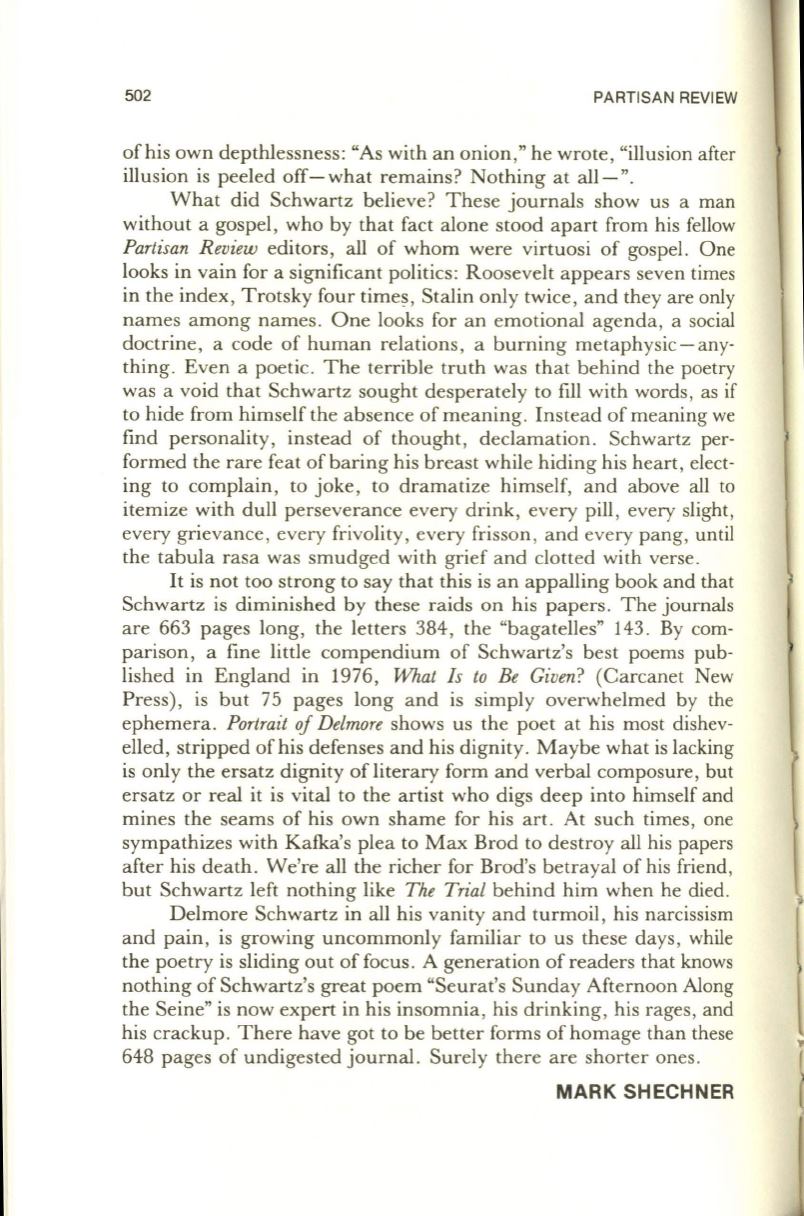
502
PARTISAN REVIEW
of his own depthlessness: "As with an onion," he wrote, "illusion after
illusion is peeled off-what remains? Nothing at all- ".
What did Schwartz believe? These journals show us a man
without a gospel , who by that fact alone stood apart from his fellow
Partisan Review
editors, all of whom were virtuosi of gospel. One
looks in vain for a significant politics : Roosevelt appears seven times
in the index, Trotsky four
time~,
Stalin only twice , and they are only
names among names. One looks for an emotional agenda , a social
doctrine, a code of human relations , a burning metaphysic -any–
thing. Even a poetic . The terrible truth was that behind the poetry
was a void that Schwartz sought desperately to fill with words , as if
to hide from himself the absence of meaning. Instead of meaning we
find personality, instead of thought, declamation . Schwartz per–
formed the rare feat of baring his breast while hiding his heart, elect–
ing to complain, to joke, to dramatize himself, and above all to
itemize with dull perseverance every drink, every pill , every slight,
every grievance , every frivolity , every frisson , and every pang, until
the tabula rasa was smudged with grief and clotted with verse.
It is not too strong to say that this is an appalling book and that
Schwartz is diminished by these raids on his papers . The journals
are 663 pages long, the letters 384 , the "bagatelles" 143 . By com–
parison, a fine little compendium of Schwartz's best poems pub–
lished in England in 1976,
JiVhat Is to Be Given?
(Carcanet New
Press), is but 75 pages long and is simply overwhelmed by the
ephemera.
Portrait of Delmore
shows us the poet at his most dishev–
elled, stripped of his defenses and his dignity . Maybe what is lacking
is only the ersatz dignity of literary form and verbal composure, but
ersatz or real it is vital to the artist who digs deep into himself and
mines the seams of his own shame for his art . At such times, one
sympathizes with Kafka's plea to Max Brod to destroy all his papers
after his death. We're all the richer for Brod's betrayal of his friend,
but Schwartz left nothing like
The Trial
behind him when he died .
Delmore Schwartz in all his vanity and turmoil , his narcissism
\
and pain , is growing uncommonly familiar to us these days, while
the poetry is sliding out of focus. A generation of readers that knows
nothing of Schwartz's great poem "Seurat's Sunday Afternoon Along
the Seine" is now expert in his insomnia , his drinking , his rages, and
his crackup. There have got to be better forms of homage than these
648 pages of undigested journal . Surely there are shorter ones .
MARK SHECHNER


